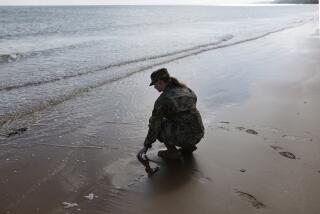Gertrude Stein meets the Great War with a zeppelin air raid
One hundred years ago, Europe stood poised on the brink of war. The literary echoes are being heard in English-language newspapers and websites this week.
The Guardian is posting the dispatches that ran in the newspaper 100 years ago, day by day. “Europe is very near war,” reads today’s entry. “Last night even the firmest friends of peace were almost without hope.” The July 31, 1914 edition of The Los Angeles Times also reported the ominous signs: “Austria will declare war against Russia tomorrow.”
But one of the biggest caches of literary works related to the war is being released by The Atlantic this week in a commemorative issue. It features excerpts from pieces that appeared in the magazine as the Great War unfolded, including pieces by Gertrude Stein, H.G. Wells, W.E.B. Du Bois and H.L. Mencken.
Stein’s contribution is an excerpt from her 1933 piece, “The War and Gertrude Stein,” in which the novelist and essayist writes from the point of view of her lover, Alice B. Tolkas. She describes how the two women responded to an alarm set off when a German zeppelin hovered over Paris. “I’m sure I don’t know what is the matter with me, but my knees are knocking together,” Tolkas says. Another zeppelin alarm comes as the two women dine with Pablo Picasso.
Marcelline Hemingway Sanford’s 1962 article describes how she discovered her brother, the not-yet-famous Ernest Hemingway, had been wounded. Marcelline had gone to the movies, and saw a newsreel in which the future Nobel laureate appeared, “in uniform, sitting in a wheelchair...being pushed by a pretty nurse.”
W.E.B Du Bois’ contribution is from the May 1915 issue of The Atlantic. Citing the European powers’ attempts to carve up Africa before the war, Du Bois writes: “in a very real sense Africa is a prime cause of this terrible overturning of civilization which we have lived to see...”
In addition, The Atlantic issue reproduces many excellent works of what we would now call “literary journalism,” including a piece by French soldier Louis Octave Philippe called “Silence at Verdun.”
“We march. A stretch interminable and lugubrious,” Philippe writes. “We wind through a little valley, cross fields, pass through ravines...”
Hector tweets about matters literary as @TobarWriter
More to Read
Sign up for our Book Club newsletter
Get the latest news, events and more from the Los Angeles Times Book Club, and help us get L.A. reading and talking.
You may occasionally receive promotional content from the Los Angeles Times.










